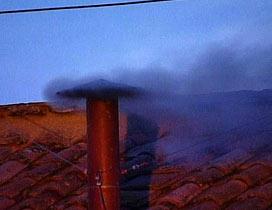
By WILLIAM J. KOLE
VATICAN CITY (AP) - Black smoke poured from the Sistine Chapel's chimney Monday evening, signaling that the cardinals sequestered inside for the first papal conclave of the new millennium failed to elect a new pope.
The black smoke emanating shortly after 8 p.m. (2 p.m. EDT) meant the 115 voting cardinal "princes" of the church would retire for the night and return to the chapel Tuesday morning for more balloting in their search for a successor to Pope John Paul II.
If two morning ballots fail to produce a pope, the cardinals could hold two more votes Tuesday afternoon.
Some 40,000 people who packed St. Peter's Square to stare at the stovepipe jutting from the chapel roof shouted, "It's black! It's black!" and snapped photos with their cell phones.
White smoke will tell the world that the church's 265th pontiff has been chosen to succeed John Paul, who died April 2 at age 84.
The cardinals, from six continents and representing 52 countries, began their secret deliberations late in the afternoon after the ceremonial closing of the massive doors of the chapel, which is decorated with frescoes by Michelangelo and wired with electronic jamming devices to thwart eavesdropping.
The excitement built as darkness set in and pilgrims watched close-ups of the chimney on giant video screens in the square.
As the smoke began pouring from the chimney, shouts of "e bianco! e bianco!" - "It's white! It's white!" - rippled through the crowd. But the cries quickly gave way to sighs of disappointment as the smoke blackened.
There was initial confusion when a Vatican Radio commentator said, "It seems white," as the first puffs emerged from the chimney. But as thick, darker smoke followed, the station proclaimed it black.
"It looks like the stove wasn't working well at first," an announcer joked a few minutes later.
_______________________________
Some procedural information and history:
Cardinals are sworn to keep the conclave procedures secret under pain of excommunication, which is a surprisingly recent punishment, dating back only a little over 100 years ago. These days electronic sweeps are made of the conclave areas to make sure there are no listening devices. Cardinals are even cut off from e-mail. No laptops or handheld computers are allowed, and mobile phones are banned.
Locking the cardinals up to deliberate and vote was designed some 800 years ago to keep secular outsiders - such as kings and emperors - from trying to influence the vote, and also to get the cardinals to reach a choice quickly. But that didn't work all the time. In 1271, an angry mob tore off the roof of the palace and reduced the cardinals to a diet of bread and water after a three-year-long conclave failed to produce a pope.
New rules promulgated by Pope John Paul II in 1996 allow election by a simple majority in extreme circumstances of a lengthy deadlock of perhaps two weeks.
But few Vatican observers expect a modern conclave to last that long.
No modern conclave has taken longer than five days.
It took eight ballots and three days in 1978 to elect Cardinal Karol Wojtyla the successor to Pope John Paul I.
I'm not expecting a three-year-long conclave or an angry mob to tear off a roof.
Bookmakers lay odds:
VATICAN CITY (CNN) -- With the College of Cardinals preparing to enter the conclave and cast the first votes for the new pontiff, bookmakers around the world are laying odds on who will emerge the 265th pope.
Betting firms and local media are backing Cardinal Joseph Ratzinger of Germany, who gave John Paul's funeral oration, but history advises punters to beware of favored candidates.
A day before cardinals begin their conclave to pick the next pontiff, Ratzinger remained comfortably ahead on three online betting boards, with Intertops giving him the shortest odds at 2-1.
Ratzinger was a 3-1 favorite for Dublin, Ireland-based Paddy Power and 7/2 at Britain's William Hill. The odds on the German had narrowed from 4-1 on Friday and 11-2 on Thursday.
French cardinal Jean-Marie Lustiger was second for both Paddy Power and William Hill. Among the top four on all three lists were 78-year-old Italian Carlo Maria Martini and his successor as the archbishop of Milan, Dionigi Tettamanzi.
Rounding out the leading six were Nigeria's Francis Arinze and Claudio Hummes of Brazil. For those favoring long odds, Paddy Power was offering 125-1 odds on nine different cardinals.
______________________________
Are people actually placing bets on the next pope?
That's just weird.
No comments:
Post a Comment